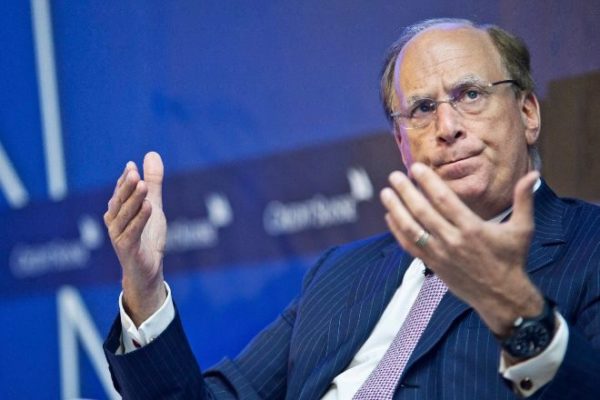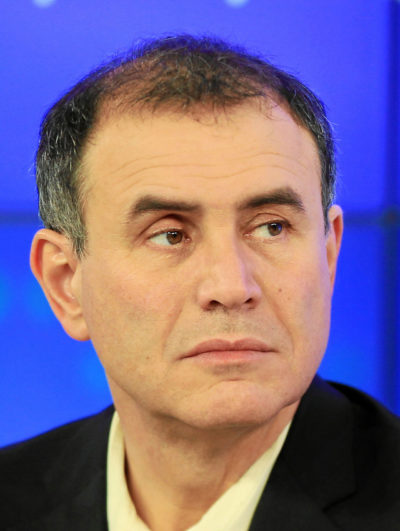Todavía no hemos resuelto la crisis del CoVID-19 en el mundo y ya estamos pensando en la recuperación de la crisis económica que ha provocado.
Esa es la actitud. O tal vez no…
Origen: El CEO de BlackRock predice que “la economía se recuperará rápidamente” | Expansion
Origen: 🦠 What Dr Doom told me about the coming recession | Exponential View
La carta anual con la que Larry Fink, consejero delegado de BlackRock, ha contado con un tema central: la crisis del coronavirus. El máximo dirigente de la mayor gestora de fondos del mundo reconoce los extraordinarios retos de la epidemia, pero también predice que la recuperación será rápida.
“El brote ha afectado a los mercados financieros con una rapidez y ferocidad que normalmente solo se ven en una crisis financiera clásica”…
“no solo ha presionado a los mercados financieros y el crecimiento a corto plazo: ha provocado una reevaluación de muchos supuestos sobre la economía global, como nuestra obsesión por las cadenas de suministro en tiempo real o nuestra dependencia de los viajes aéreos internacionales”…

“La psicología de los inversores cambiará. Los negocios cambiarán. El consumo cambiará. …”
Pero el directivo adelanta también que … “la economía se recuperará rápidamente. Los bancos centrales se están moviendo rápidamente para abordar los problemas en los mercados de crédito, y los gobiernos ahora están actuando agresivamente para promulgar el estímulo fiscal … probablemente serán más efectivas y funcionarán más rápidamente ya que no están luchando contra los mismos desafíos estructurales que los de hace una década”.
Para Fink, el desafío se centra especialmente en las empresas más endeudadas y los colectivos económicamente más vulnerables.
Para el que pueda invertir todavía, es “una oportunidad atractiva para reequilibrarse en renta variable. De hecho, muchos de nuestros clientes, incluso aquellos que generalmente tienen una gran asignación de renta fija debido a sus perfiles de riesgo, buscan aumentar su presencia en renta variable.”
* * * *
I’d been very wary of the optimistic economic forecasts coming from the investment banks. Take Goldman Sachs. The firm posited that US GDP would finish the year 6.2% down as a result of the economic havoc wrought by the pandemic.
Hearing Professor Roubini talk was a dose of reality. Bear in mind that his reputation is for pessimism, but I felt he was clear enough that I wanted to share the insights with all of you.
The shock to the global economy from Covid-19 has been faster, and more severe than the 2007/2009 global crisis, and even the beginning of the Great Depression. It took about three years for financial shocks previously. But this has happened in three weeks.
As Roubini puts it:
People initially said ‘Is this going to be a V-shaped recovery or is it going to be a U with a gradual recovery or is it going to be an L with stagnation or a W, a double dip?’
It is not a V. It is not a U. It is not an L. It is not a W.
It is an I. A straight line down. Output is down. Consumption is down. Capex is down. Residential investment is down. Exports are down. Imports are down.
In fact, it is “as real as if an asteroid and hit the planet Earth and economic activity shut down.”

China is slowly getting back to work. And the lesson seems to be that a hard suppression gets the economy back on track more quickly than what Roubini calls America’s “mitigation light.” Italy might follow suit.
However, the good news that China and the Asian economies may start to power up may not help Western economies, particularly the US.
China is moving swiftly to position itself as a leader amidst the chaos, especially with the US likely to be mired in the crisis at home for weeks or months to come.
It is even possible that China becomes the global economic and financial safe haven. The government has plenty of dry powder, consumer demand is healthy (buffered by deep household savings) and odds are they have domestic Covid-19 infections under control.
And so in this environment, of China getting back to work and the US struggling with an accelerating pandemic, I want to highlight three, of many, observations from Roubini:
- This pandemic is causing a global supply chain shock. Roubini agrees this is happening and that we will likely see a reshoring of production. But reshoring will become expensive, as firms allocate labour and capital not to places where they are cheapest, but to places which best serve the needs of national self-sufficiency.
And to avoid the higher costs being passed on, firms will need to reduce labour costs. So one consequence will be the US firms “going even further in the direction of AI, robotics and automation to create economic efficiency. Of course, this hurts labour.” - For tech firms, there will be a mixed picture. As Roubini points out, data suggests Amazon and Microsoft are doing well.
But Google and Facebook face headwinds because of their advertising business model: “with the collapse of economic activity, as spending is going to be sharply cut […] and even when the economy recovers, the dynamic recovery is going to imply that firms are going to be very cautious in their ad spending. You don’t want to really spend tonnes of money on ads in the future.” - Even under optimistic conditions, this recession is going to last two to three quarters, says Roubini. By the end of the year, there will be some light at the end of the tunnel.
He believes that the response needs to emphasise at least four types of infrastructure.
First, human capital infrastructure: “We don’t have the right human capital. And unless we invest in people, people will be left behind or replaced by technology. The industries of the future are based on innovation, on knowledge, and on human capital,” rather than on natural resources.
Second, physical infrastructure, including tech infrastructure: “The physical infrastructure of the US is crumbling, but the digital and tech infrastructure is as well. There must be a basic industrial policy wherein the key industries, there is enough basic research and basic incentives that the US won’t be left behind, starting with AI.
Third, environmental infrastructure. “We have to deal with climate change – extreme weather events, natural disasters – and we have to invest in the green economy. We don’t have social or community capital, and unless we invest in these things, we’re going to lose the battle.
Four, institutional infrastructure. “We have to invest into our institutional capital. Look at the chaos politically in Washington. In other countries, you tell people to stay at home and they have enough social capital that they obey and stay at home. In the US, we are the Land of the Free and we don’t care, we go out. So unless we invest in these the social and community capital, we’re going to lose the battle with China and with the rest of the world.”
In other words, money alone won’t do. A directed plan, a vision about what comes next, is needed to drive through this shock.
